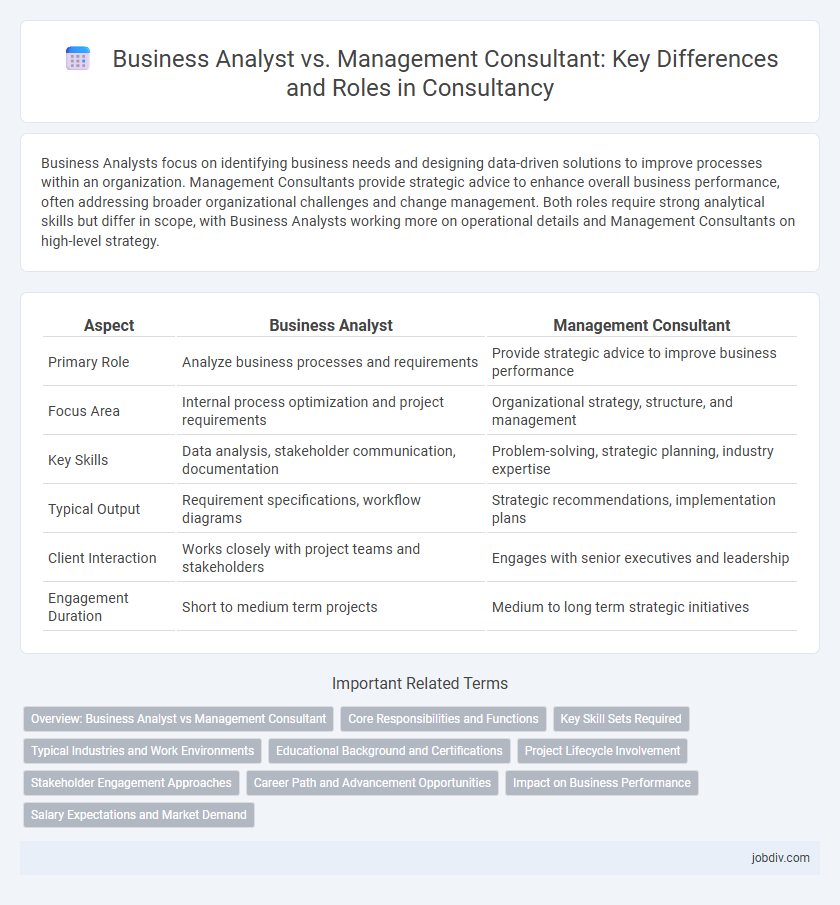Business Analysts focus on identifying business needs and designing data-driven solutions to improve processes within an organization. Management Consultants provide strategic advice to enhance overall business performance, often addressing broader organizational challenges and change management. Both roles require strong analytical skills but differ in scope, with Business Analysts working more on operational details and Management Consultants on high-level strategy.
Table of Comparison
| Aspect | Business Analyst | Management Consultant |
|---|---|---|
| Primary Role | Analyze business processes and requirements | Provide strategic advice to improve business performance |
| Focus Area | Internal process optimization and project requirements | Organizational strategy, structure, and management |
| Key Skills | Data analysis, stakeholder communication, documentation | Problem-solving, strategic planning, industry expertise |
| Typical Output | Requirement specifications, workflow diagrams | Strategic recommendations, implementation plans |
| Client Interaction | Works closely with project teams and stakeholders | Engages with senior executives and leadership |
| Engagement Duration | Short to medium term projects | Medium to long term strategic initiatives |
Overview: Business Analyst vs Management Consultant
Business Analysts focus on improving internal processes by gathering and analyzing data, defining requirements, and facilitating communication between stakeholders and technical teams. Management Consultants provide strategic advice to enhance overall organizational performance, addressing market dynamics, competitive positioning, and long-term growth initiatives. While Business Analysts emphasize operational efficiency and project delivery, Management Consultants concentrate on high-level business strategy and transformation.
Core Responsibilities and Functions
Business Analysts primarily focus on identifying business needs, analyzing processes, and defining requirements to improve operational efficiency and support IT solutions. Management Consultants concentrate on strategic planning, organizational change, and advising senior leadership to enhance overall business performance and competitive positioning. Both roles require strong problem-solving skills but differ in scope: Business Analysts work closely with internal teams on project-specific goals, while Management Consultants address broader business challenges and transformation initiatives.
Key Skill Sets Required
Business Analysts excel in data analysis, requirements gathering, and process modeling, emphasizing technical proficiency in tools like SQL, Excel, and UML. Management Consultants prioritize strategic thinking, change management, and stakeholder communication, leveraging expertise in market analysis, organizational behavior, and leadership frameworks. Both roles demand strong problem-solving abilities, but Business Analysts concentrate on detailed project execution while Management Consultants focus on high-level business transformation and advisory services.
Typical Industries and Work Environments
Business analysts typically operate within industries such as finance, healthcare, and technology, focusing on data-driven project development and process optimization often embedded in corporate IT or operations teams. Management consultants are commonly engaged across diverse sectors including manufacturing, retail, and public services, advising senior leadership on strategic planning, organizational change, and performance improvement in client-facing or consulting firm environments. Both roles demand strong analytical and communication skills but differ in the scope of influence, with business analysts concentrating on internal systems and management consultants addressing broader organizational challenges.
Educational Background and Certifications
Business Analysts often hold degrees in business administration, finance, or information technology, with certifications like CBAP (Certified Business Analysis Professional) enhancing their expertise. Management Consultants typically have backgrounds in business management, economics, or engineering, supplemented by certifications such as PMP (Project Management Professional) or CMC (Certified Management Consultant). The distinct educational requirements and certifications reflect the differing roles: Business Analysts focus on data-driven decision-making and process improvement, while Management Consultants emphasize strategic advisory and organizational change.
Project Lifecycle Involvement
Business Analysts engage deeply in the project lifecycle by gathering requirements, facilitating stakeholder communication, and ensuring solutions align with business goals from initiation through deployment. Management Consultants focus on strategic phases, such as problem diagnosis, strategy formulation, and high-level project planning, often influencing multiple projects or organizational units. Both roles overlap during project execution but differ in scope, with Business Analysts concentrating on detailed process improvements and Management Consultants targeting broad strategic outcomes.
Stakeholder Engagement Approaches
Business Analysts prioritize detailed stakeholder analysis and continuous collaboration to ensure project requirements align with business needs, utilizing techniques such as interviews, workshops, and feedback loops to maintain clarity and consensus. Management Consultants adopt a broader approach, emphasizing strategic stakeholder mapping, influence assessment, and change management to drive organizational transformation and align diverse interests with overall business objectives. Both roles leverage tailored communication strategies and stakeholder engagement frameworks to enhance decision-making and achieve sustainable outcomes.
Career Path and Advancement Opportunities
Business Analysts typically begin their careers by developing strong analytical skills and industry knowledge, often advancing into senior analyst or product owner roles, while Management Consultants progress by solving complex business problems and advising executives, with pathways toward partner or director positions in consulting firms. Both careers offer opportunities for specialization in areas like strategy, operations, or technology, but Management Consultants generally experience faster advancement due to diverse project exposure and client interaction. Professional certifications such as CBAP for Business Analysts and MBA or MBB (McKinsey, BCG, Bain) experience for Management Consultants significantly enhance career growth and earning potential.
Impact on Business Performance
Business Analysts optimize business processes by leveraging data analytics and stakeholder insights to identify inefficiencies and recommend targeted improvements, which directly enhance operational performance and reduce costs. Management Consultants focus on strategic initiatives, organizational change, and market positioning, driving long-term growth and competitive advantage through comprehensive business transformation. Both roles impact business performance significantly but differ in scope: Business Analysts provide tactical, data-driven solutions, whereas Management Consultants deliver high-level strategic direction.
Salary Expectations and Market Demand
Business Analysts typically have salary expectations ranging from $65,000 to $95,000 annually, while Management Consultants often command higher salaries between $90,000 and $130,000 due to their strategic expertise. Market demand for Management Consultants remains robust, driven by organizations seeking growth strategies and organizational change, whereas Business Analysts are increasingly vital in data-driven project implementations and process optimization. Both roles are essential in consultancy, but Management Consultants generally experience greater salary growth potential aligned with their broader scope and impact.
Business Analyst vs Management Consultant Infographic

 jobdiv.com
jobdiv.com